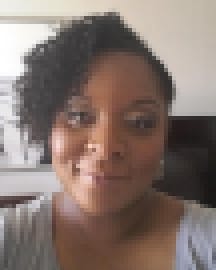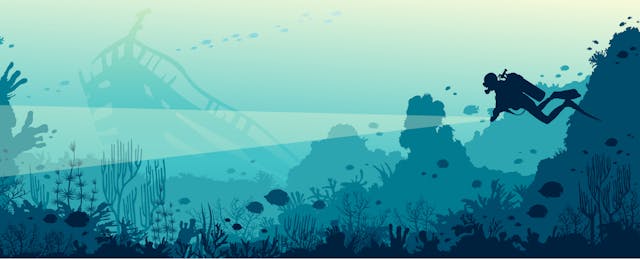High school science instructor Veronica Wylie has an idea that will take her students to new heights一or rather, new depths.
The Mississippi teacher is tackling the issue of representation in the sciences by earning a diving certification, and she’s working through archaeology and marine life training with her nonprofit partners.
If all goes according to plan, Wylie won’t just be teaching about marine biology from her classroom next year. She and her students from the small town of Hazlehurst, about 35 miles southwest of state capital Jackson, will be surrounded by it as they explore explore African slave trade shipwrecks off the coast of Florida.
“I have brilliant, gifted students who don’t often have all the opportunities and resources that I did, and one of the things I feel is my responsibility to bring some here,” Wylie says. “These are probably some of the smartest students I’ve ever taught.”

Wylie adds that the school district where she teaches chemistry and physical science has just three schools, and students are predominantly African American with a growing Latino population. If you asked students to draw a photo of a scientist, she says, chances are good they will hand you a picture of an old white man.
“We generally focus on Einstein or Newton, and there is seldom a conversation about other people who have contributed to science,” Wylie says. “When we talk about representation, it's difficult for people to desire to be what they’ve never seen before. If they’ve never seen a Black person or woman or Hispanic or someone from this area [as a scientist], there's no concept of that being possible.”
Wylie isn’t alone in believing that representation plays an important role in helping students succeed. It matters at the front of the classroom too. Researchers at the University of Pennsylvania have found that Latino students’ unexcused absences decreased when they had more Latino teachers. And it matters in learning materials as well, say six colleges and universities in Massachusetts that have teamed up to create a new catalog of culturally relevant textbooks in hopes of improving student outcomes.
“Cultural competence means creating an environment in which students can feel they belong and can be themselves,” write the authors of “Culturally Relevant Pedagogy: A Model To Guide Cultural Transformation in STEM Departments.” “This is crucial in STEM fields, which are haunted by the ‘lone genius’ and ‘white men in lab coats’ stereotypes.”
Into the Deep End
Wylie’s path to becoming a seafaring scholar initially had nothing to do with teaching. Her interest was sparked by an article about journalist and scuba diver Michael Cottman, who has made dives at and chronicled the history of a sunken colonial slave ship off Florida’s coast.
“I thought, ‘How in the world do I get to do that?’” Wylie recalls. “I was an African American studies minor [in college], and I was so enamored. I was Googling like crazy.”
It was through her research that Wylie came across Diving With a Purpose, a nonprofit that partners with the National Association of Black Scuba Divers to educate the public on and preserve submerged heritage sites important to the African Diaspora.

“It never occurred to me that people of color were this involved in this sport,” says Wylie, who did her scuba training in Atlanta with the president of the National Association of Black Divers. Wylie covered the cost of her training through a Fund for Teachers fellowship.
When she realized the nonprofit had a youth program, Wylie saw how it tied into her curriculum on marine biology. She began formulating a plan to get her students involved.
Wylie says that in landlocked Hazlehurst, her students will take their own Youth Diving With a Purpose scuba training in pools and then hopefully during visits to the coast. When everyone is ready to go on dives next year, there will be two-day trips to explore sites like shipwrecks, coral reefs and rock quarries.
Beyond diving, Wylie is collaborating with the National Association of Black Divers to develop culturally relevant curriculum for their trainings一and she’s got materials in the works for her own classes. She is already operating her own small nonprofit called STEMSouth that aims to break down stereotypes around those who deserve a place in the sciences.
“In textbooks, on posters, there are very few people who look like me,” Wylie says. “It doesn’t mean we should exclude the people who are already represented. The rest of us want to be seen and represented, as well. One of my goals working on this curriculum is for it to look like people in the community.”
A Better Experience
Wylie’s own negative experiences in science classes fuel her drive to help her students realize that they can enjoy the subject一or, at the very least, succeed in the sciences even if they don’t love it.
It wasn’t lost on a high school-aged Wylie, who grew up in Denver, that she as a Black student was singled out for microaggressions from teachers that were “extremely repulsive.” Like one instructor who joked daily that Wylie appeared to be under the influence in class.
“It was comments about my intellect, said in jest, but I had a major disdain for biology,” she recalls.
Wylie got the last word, quite literally, with one of her teachers. After graduating from college, she went back to her high school to share the news. He seemed excited to see her, despite the demeaning comments he made while she was his student.
“I said, ‘I’m working as a chemical technician in Thousand Oaks, Calif., I got my degree in chemistry, and I make more money than you do,’ and that was the end of the discussion,” Wylie recalls. “I felt the need to say, ‘You thought I was stupid, and I’m not.’”
It wasn’t the smartest decision in retrospect, she admits, as Wylie later became a substitute teacher at the school. They never became permanent colleagues, but Wylie says it all worked out when got a full-time job at a different school where she had close mentors.
“God will allow doors to close so you can walk though your appropriate door,” she says.
Ultimately, Wylie says she wants to teach her students that they shouldn’t box themselves in based on others’ expectations.
“Make your own box. What I’m learning as an adult is that the 101 things I’m interested in converge into the perfect job,” Wylie says. “If I let other people define me, I wouldn’t be where I am. As educators, we have to keep that in mind.”


